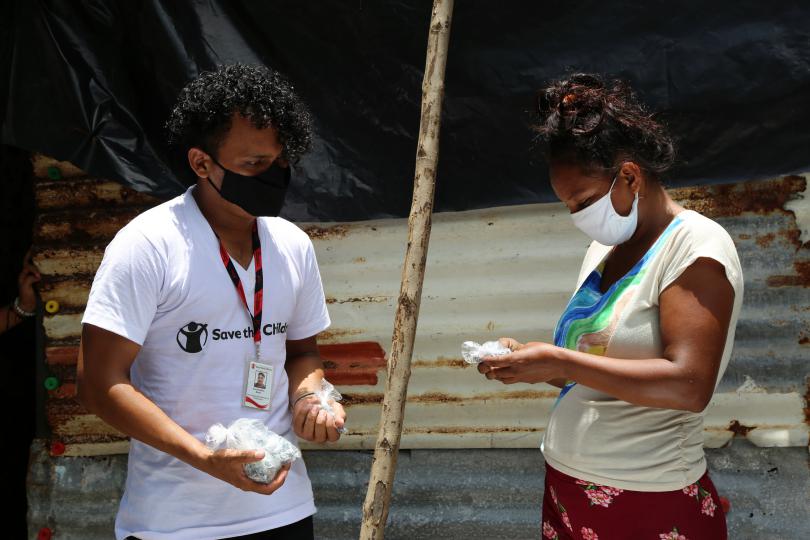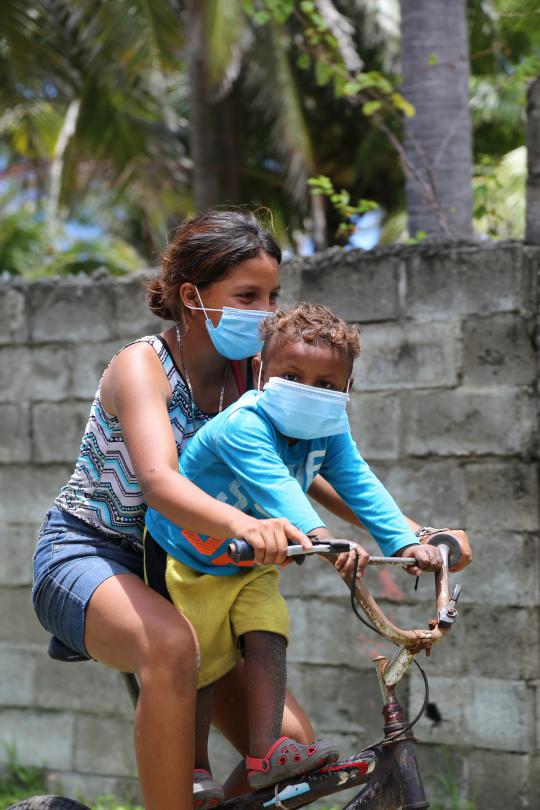"We spent weeks with the house flooded by Storm Amanda"

The rainy season in El Salvador has always been difficult for Esperanza and her family. All the houses in her neighbourhood flood whenever it rains very hard or for several days because her street does not have any way to drain the water. So far, the authorities have not offered a solution.
"If there is rain, it always fills up with water. First, we put up our furniture. Then, we find where to lock the furniture, so it doesn't get ruined. We raise the beds on bricks, so they don't get wet," Esperanza explains.
But the night of May 31st was much worse than usual. Torrential rains from Tropical Storm Amanda quickly flooded the Triunfos de La Paz community, where Esperanza lives with her partner, her 11-year-old daughter Azucena, and her two-year-old son Carlos. Things got worse when the storm Cristóbal came right after Amanda, hitting El Salvador between May 31st and June 6th. The storms forced Esperanza and her family to spend almost three weeks locked in their small house. After eight days of constant rain and lack of proper drainage in the community, they were unable to leave the house because the water reached almost to their hips.
"When we realized that the rain was going to last for several days, we were distressed. Here it gets too flooded on a rainy day, now imagine eight days. We felt like we were going to drown and we didn't know what to do. When the storm passed, our houses and streets were flooded for about 15 days," says Esperanza.
Amanda was officially the first tropical storm of 2020 to make landfall along the east coast of the Pacific Ocean. Although short-lived, it left in its wake a trail of devastation from southern Mexico to Nicaragua. Still, it was in El Salvador that it unleashed its most incredible fury, severely affecting nearly 150,000 people, as reported by the UN Office for the Coordination of Humanitarian Affairs (OCHA).
By joining tropical storm Cristóbal from the Atlantic, the two meteorological phenomena caused floods and landslides in almost the entire territory of the country. Damage to public infrastructure has been estimated to reach at least USD 8 million. Furthermore, the UN World Food Program reports that the storms destroyed about USD 21 million in crops, placing more than 336,000 people at risk of food insecurity.
Esperanza and her family share a piece of land with other relatives, who have built small houses with dirt floors, walls, and tin roofs just like Esperanza's house. Weak buildings are particularly vulnerable to inclement weather, and Esperanza's home could not withstand the eight days of rain caused by storms.
"On the second day, when it started to rain heavier, the sheets chipped and broke. The ceiling no longer works. Now, every time it rains, I have to take the bed outside to dry it out and make sure it does not rot," she explains.
For this reason, and as part of its response to the emergency caused by storms Amanda and Cristóbal, Save the Children in El Salvador delivered home improvement kits to 50 families, including Esperanza's. Another 315 families received family hygiene kits and multipurpose cards to help them purchase food.

"With this, I will be able to fix my house so that it no longer gets wet. It makes me happy because we couldn't even sleep when it rained. I thank Save the Children for the support they have given other families and me in the community," explains Esperanza.
Repairing her home lifts a small weight off the shoulders of Esperanza and her family. Women like Esperanza are on the front line during emergencies, performing critical storm preparedness and mitigation actions in their homes, in addition to general tasks such as fetching water, cleaning the house, and cooking, to take care of their families.
Esperanza hopes that things will improve before the cane cutting season begins when she can work as a cane cutter and contribute to the family’s income, as her partner's income has been severely affected by both the pandemic and the storms. In the same way, she dreams that the schools will reopen so that Azucena can go back to studying and playing with her friends, because she knows that the girl needs to regain some form of normalcy in her life.

However, as long as the problem of drainage in the Esperanza community remains unsolved, her family and all the other people who live in Triunfos de La Paz will continue to live in fear of constant flooding in their streets and homes.
* The names of the protagonists of the story have been modified to keep them confidential.


